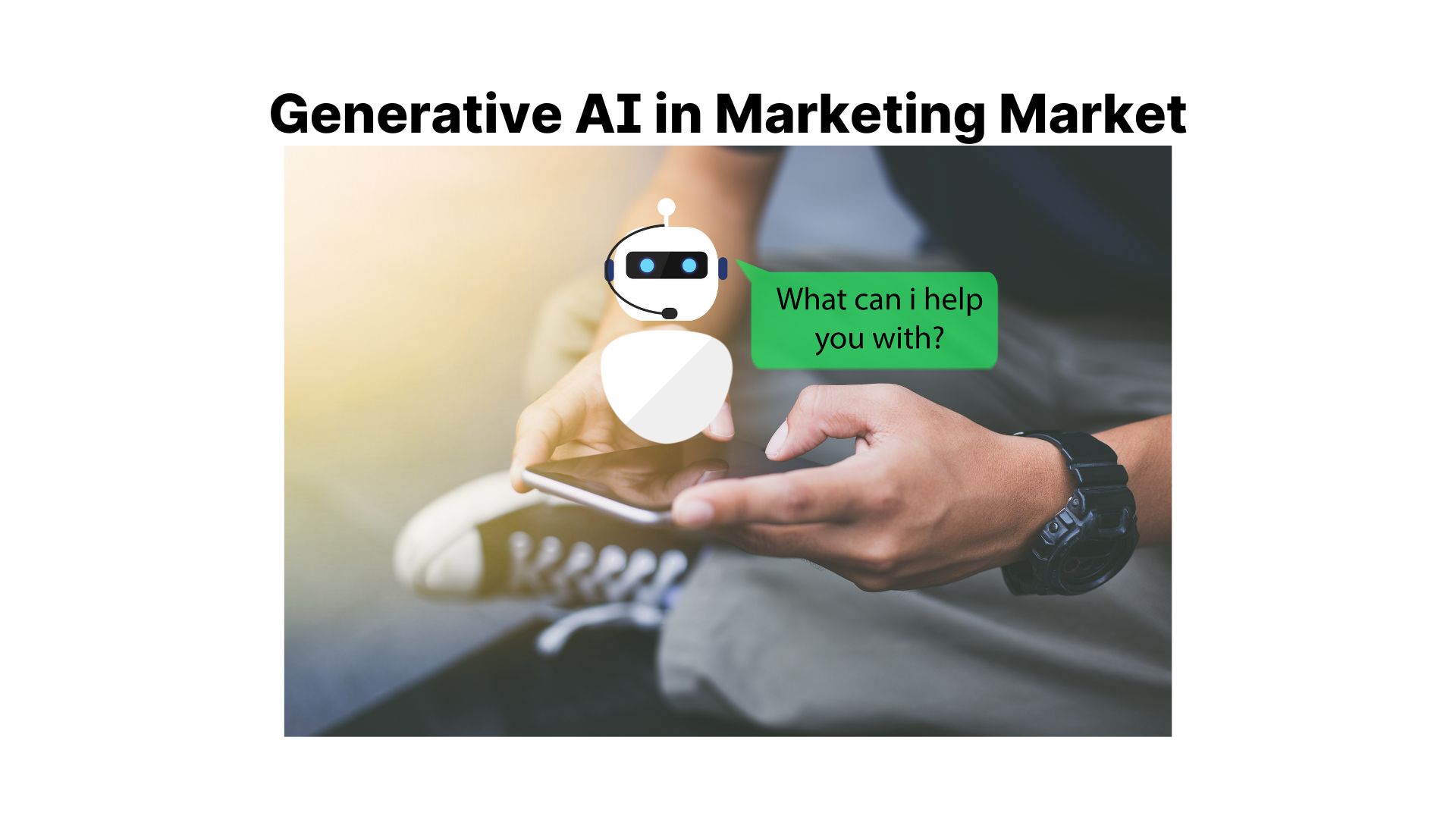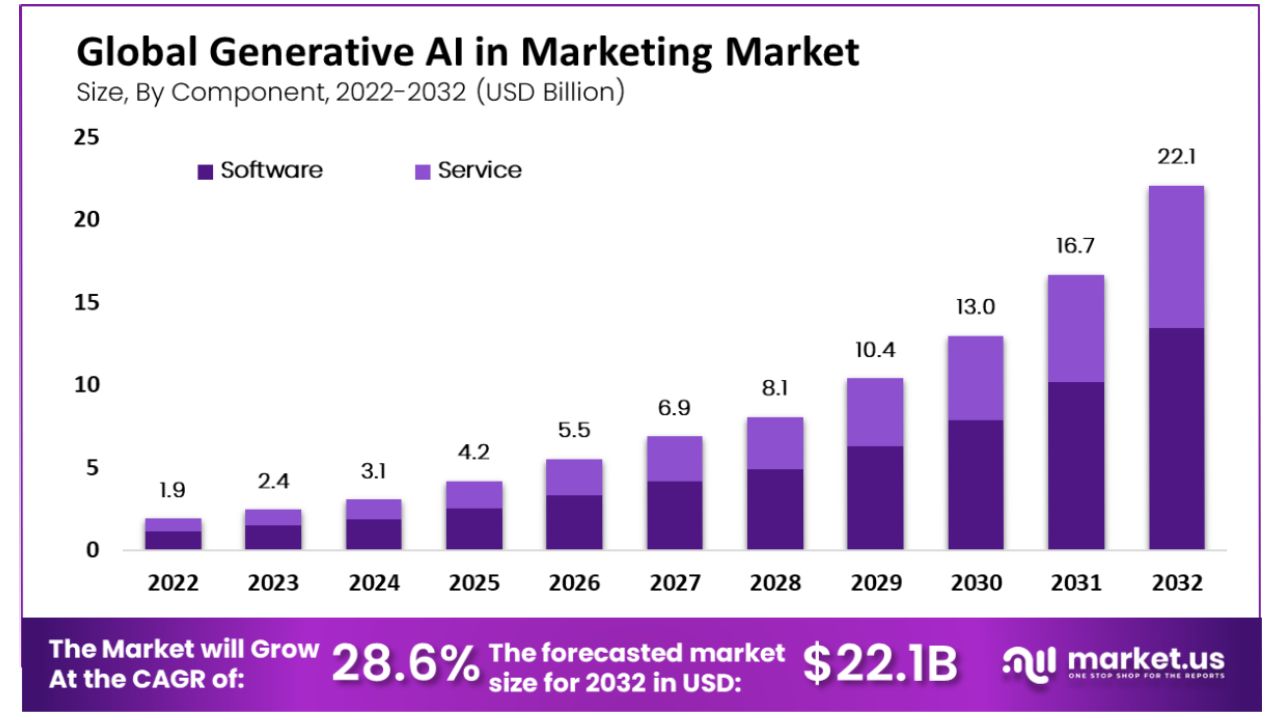Generative AI in Marketing Market Size to Reach USD 23.5 Bn by 2032 – Rise with Steller CAGR 28.6%

Page Contents
Market Overview
Published Via 11Press : In 2022, the Global Generative AI in Marketing Market was estimated to be valued at USD 1.9 Billion and it is projected that between 2023-2032 this market will experience compound annual growth at 28.6% reaching an anticipated total market size of USD 23.5 billion over its forecast period.
Generative AI is an emerging technology with the potential to transform marketing. Utilizing machine learning algorithms, Generative AI creates original text, images, and videos for use across advertising, social media marketing, email marketing, etc.
The market can be segmented based on application, deployment mode, component, and region. By application the market can be divided into virtual assistants, chatbots, creative content creation services, and others; by deployment mode into cloud and on-premise deployment; component-wise into solutions and services while by region it could include North America, Europe Asia Pacific Middle East Africa Latin America.
North America is projected to lead the AI market during its forecast period due to the presence of major AI vendors, the high adoption rate of AI technologies, and increasing investments in AI research and development. Asia Pacific however is forecasted to experience exponential compound annual growth due to increasing adoption rates for AI technologies by countries such as China, Japan, and India.
Key players in the generative AI market include IBM Corporation, OpenAI, Adobe Inc., Facebook, Google LLC, Microsoft Corporation, NVIDIA Corporation, Salesforce.com Inc., Uber AI Labs, and Amazon Web Services, Inc. These organizations are all developing advanced generative AI solutions in response to an increase in marketing industry demand for these solutions.
For further details on major revenue-producing segments, request a pricing optimization software market Request for PDF sample report

Key Takeaways
- The global market for generative AI is projected to experience exponential growth over the coming years, driven by rising consumer demand for personalized content and the need to automate content production.
- The market can be divided by application, deployment mode, component, and region; key applications of virtual assistants are virtual assistants chatbots and creative content creation. North America is expected to lead in terms of market size while Asia Pacific shows the highest compound annual compound growth rate over the forecast period.
- Key players in the market include IBM Corporation, OpenAI, Adobe Inc., Facebook, Google LLC, Microsoft Corporation, NVIDIA Corporation, Salesforce.com Inc, Uber AI Labs and Amazon Web Services Inc as the key competitors.
Regional Snapshot
- North America is projected to lead the generative AI in marketing market during the forecast period due to high rates of adoption of AI technologies, the presence of major vendors offering such technology, and increasing investments into AI research and development. The United States stands out as the leader among North American countries due to the presence of large tech companies as well as their increasing demands for personalized content.
- Europe is projected to experience rapid expansion of the generative AI in marketing market due to increasing adoption of AI technologies by countries such as Britain, Germany, and France. Asia Pacific region is forecasted to experience compound annual compound annual growth due to growing adoption in China, Japan, and India.
- Latin America and Middle East/Africa are projected to experience rapid expansion of the generative AI marketing market, due to rising demands for personalized content production and automation needs. However, their market shares should remain lower compared with North America, Europe and Asia Pacific.
Drivers
- Demand for Customized Content: As internet and social media users continue to rise, consumers increasingly desire personalized content tailored specifically to their interests and preferences. Generative AI offers marketers an effective solution in creating relevant material for their target audiences that resonates.
- Content Creation Needs Automating: Content creation can be time-consuming and expensive; Generative AI can assist marketers by automating this process, helping them produce high-quality material efficiently at lower costs.
- Growing Adoption of AI-Powered Chatbots: Bots powered by artificial intelligence is becoming more widely adopted for customer support and service roles, providing fast, accurate responses to customer queries for an improved and personalized customer service experience.
- Advancements in AI Technology: Advancements in artificial intelligence technology such as natural language processing (NLP) and computer vision are allowing generative AI to produce more realistic content such as human-like texts and images, creating sophisticated generative artificial intelligence solutions for creation.
Restrictions
- Lack of Human Touch: While generative AI may create high-quality content, it may lack the creative spark needed to truly engage readers and make the experience truly engaging and memorable.
- Ethical Concerns: Concerns remain over the use of generative AI for creating content, especially when used to produce fake news and deep fakes. Such concerns could lead to increased scrutiny and regulations surrounding its usage in marketing applications.
- Complexity and Cost: Implementing AI solutions can be both complicated and expensive for smaller organizations with limited resources.
- Generative AI Can Be Useful for Certain Marketing Applications: Generative AI has great potential across a range of marketing applications; however, there may only be specific instances in which it provides significant value compared to conventional content creation methods.
Opportunities
- Generative AI provides businesses with multiple opportunities for personalization and automation of content creation processes – increasing consumer engagement while driving sales.
- Generative AI also reduces the time and cost spent creating this material by automating it for distribution through other channels such as Facebook or Instagram ads.
- Generative AI offers marketers an efficient means of producing large volumes of content quickly and efficiently, enabling them to scale up their content marketing initiatives quickly. Innovation: Since generative AI is still relatively new technology, there is great scope for innovation within its application to marketing.
Challenges
- Generative AI-generated content may lack the same creativity and emotional depth of human-created pieces, which presents its own set of unique challenges.
- Generative AI raises ethical concerns when used for creating content such as fake news and deepfakes, raising issues around data privacy and security.
- Generative AI relies on large amounts of data for training its algorithms, leading to privacy and security concerns related to this method of artificial intelligence development.
- Integrating Generative AI: Integrating Generative AI can be challenging for small and midsized businesses.
- Implementation of generative AI solutions can be costly for smaller businesses with limited resources.
Recent Developments
- Advanced Natural Language Processing (NLP) capabilities: Generative AI in marketing has advanced NLP capabilities that can understand and respond to natural language, making communication with customers more human-like and personalized.
- Predictive modeling: AI-powered predictive modeling has become increasingly sophisticated in recent years, allowing marketers to make more accurate predictions about customer behavior and preferences.
- Creative content generation: AI-powered marketing tools can generate creative content, such as ad copy, product descriptions, and even music, without human intervention.
- Image and video recognition: AI-powered marketing tools can analyze images and videos to identify relevant content, such as product features, and suggest personalized recommendations.
- Customer segmentation: AI-powered marketing tools can analyze customer data to create targeted marketing campaigns and improve customer engagement.
Key Market Segments
Component
- Service
- Software
System Type
- Text Models
- GPT-3
- LaMDA
- LLaMA
- Multimodal Models
- GPT-4
- DALL-E
- Stable Diffusion
- Progen
Application
- Text Generation
- Image Generation
- Video Generation
- Music Generation
- Search Engine Optimization (SEO)
- Other Application
End-User Industry
- Media & Entertainment
- IT & Telecommunications
- Healthcare
- Automotive & Transportation
- BFSI
- Other End-Use Industries
Top Key Players
- Microsoft Corporation
- IBM Corporation
- Google LLC
- Amazon Web Services. Inc.
- Adobe Inc.
- AI
- Synthesis AI
- Genie AI Ltd.
- MOSTLY AI Inc.
- AI
- Open AI
- Other Key Players
Report Scope
| Report Attribute | Details |
| The market size value in 2022 | USD 1.9 Bn |
| Revenue forecast by 2032 | USD 23.5 Bn |
| Growth Rate | CAGR Of 28.6% |
| Regions Covered | North America, Europe, Asia Pacific, Latin America, and Middle East & Africa, and Rest of the World |
| Historical Years | 2017-2022 |
| Base Year | 2022 |
| Estimated Year | 2023 |
| Short-Term Projection Year | 2028 |
| Long-Term Projected Year | 2032 |
FAQs
Q: What is generative AI in marketing?
A: Generative AI is a type of artificial intelligence that can generate new and unique content, including text, images, and videos. In marketing, generative AI is used to create personalized marketing campaigns that are tailored to individual customers.
Q: How can generative AI improve marketing efforts?
A: Generative AI can improve marketing efforts in several ways, including enhancing personalization, improving ROI, and analyzing large amounts of data to make data-driven decisions.
Q: What types of companies are using generative AI in marketing?
A: Companies of all sizes and industries are using generative AI in marketing. Some examples include retail companies, financial institutions, and healthcare providers.
Q: Is generative AI ethical in marketing?
A: The use of generative AI in marketing can raise ethical concerns, particularly around data privacy and the potential for bias in algorithms. However, companies can take steps to ensure that their use of generative AI is ethical and transparent.
Q: How can companies implement generative AI in their marketing efforts?
A: Companies can implement generative AI in their marketing efforts by partnering with a vendor that specializes in generative AI or by building their own generative AI solutions in-house. It's important for companies to have a clear understanding of their goals and the data they will be using before implementing generative AI in their marketing efforts.
Content has been published via 11press. for more details please contact at [email protected]
The team behind market.us, marketresearch.biz, market.biz and more. Our purpose is to keep our customers ahead of the game with regard to the markets. They may fluctuate up or down, but we will help you to stay ahead of the curve in these market fluctuations. Our consistent growth and ability to deliver in-depth analyses and market insight has engaged genuine market players. They have faith in us to offer the data and information they require to make balanced and decisive marketing decisions.